Features
United States transitions to the Law of the Jungle on Jan. 20
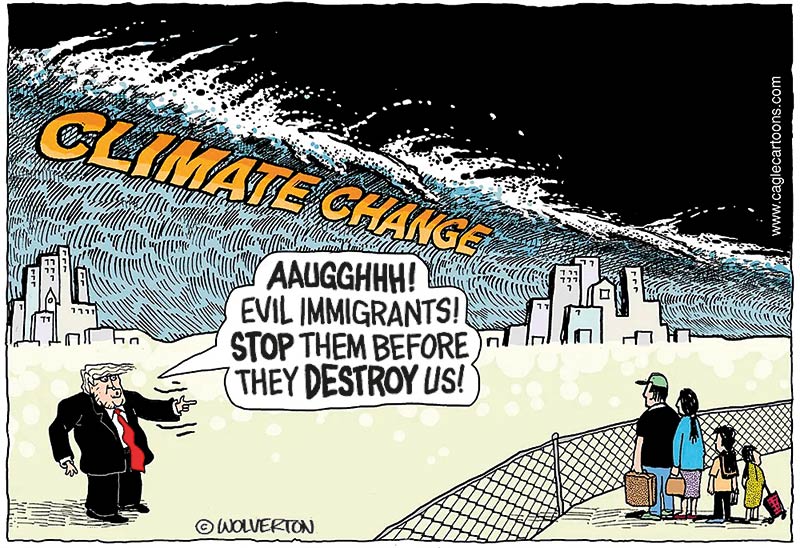
Canada, Mexico, even war-torn Ukraine and adversarial Iran offer support, firefighters to contain Los Angeles wildfires, President-elect Trump sends misinformation
by Vijaya Chandrasoma
Mother Nature provided the most appropriately tragic backdrop to the imminent end of the Great Experiment of Democracy in the United States of America, the nation that has long been considered the Cradle of Democracy and the Leader of the Free World. The ongoing wildfires in California could well be the worst natural disaster the US has faced in history, a tragedy diminished only by the Second Coming of the Orange Jesus.
California, the most beautiful and populous state in the Union, has been, over the years, ravaged by natural disasters like earthquakes, wildfires, winter storms and droughts. Due to climate change, these disasters keep growing in size, frequency and intensity, with wildfire seasons growing longer in duration.
The current wildfires have now been brought under a certain degree of control in most areas. Residents who were forced to evacuate have been allowed to return to their homes, those which had not been totally destroyed. Wildfires in the most affluent and humble areas alike have devastated entire communities. Beautiful and wealthy homes and buildings in prestigious Los Angeles communities like the Pacific Palisades, Malibu and Pasadena now resemble bomb-stricken areas on the Gaza strip, with entire neighborhoods turned into rubble and ash.
The ferocity of these wildfires has also shown the resiliency of the human spirit. Devastated communities are pulling together, neighbors risking their lives to help neighbors. There was an outpouring of sympathy and assistance from all parts of the nation and the world. Mexico and Canada, among other nations, amazingly even war-torn Ukraine, a country which has been the victims of relentless bombing for three years, have sent their first responders to help in California’s disaster.
Of course, this compassion hardly touched the man who was going to be the president of the country in a few days. Trump has already started the blame game, accusing California Governor Newsom (or to use his kindergarten nickname, New-scum) for mismanagement of the proliferation of wildfires in California.
As these devastating fires continue to burn through Los Angeles, Donald Trump, self-proclaimed climate change scientist, continues with his theory that climate change is a hoax. His latest idiocy is that the current California fires were not caused by severe Santa Ana winds. Nor the unusually dry weather. Nor the possibilities of arson and negligence.
No, they were caused by a fish. A tiny bony fish, called a “smelt” that Trump alleges California’s Democratic Governor, Gavin Newsom, used precious water to protect, rather than conserving the water for the wildfires. As always, a monstrous lie. Trump states that one of his first duties after inauguration, after mass deportation of illegal immigrants and immediate drilling for oil, would be to deregulate non-existent water restoration plans, approved by Governor Newsom to protect an “essentially worthless fish”. Promises that will all meet the fate of the famous 2016 promise of the 3,000-mile border wall paid by Mexico.
The world’s real climate change scientists believe that we have already “passed the tipping point where the earth’s climate has crossed into a different system leading to potentially irreversible, catastrophic events”. Yet we remain complacent, take no serious action to mitigate these disasters.
On a lighter note, this year’s ongoing transition of power has thrown up a few cringeworthy “firsts” in the nation’s history.
This is the first time a president-elect has continued to sell, publicly and on TV, various products, like “golden” sneakers, Inauguration edition Bibles, wristwatches, boots, even autographed guitars. A more classless and tacky enterprise to disgrace the institution of the presidency would be hard to find. But once a snake-oil salesman, always a snake-oil salesman.
At a press conference after the November election, Trump claimed that the terror group, Hezbollah was responsible for the January 6, 2021 insurrection. A little later, at the same conference, he said he was going to pardon the “patriots” who carried out the same January 6 insurrection. Hezbollah will be so happy at being called patriots by the United States President-elect.
The year 2025 marks the first time a convicted felon has ever been the president-elect of the United States in its history. It is also the first time that the convicted felon president-elect has nominated another convicted felon, his son-in-law Jared’s father, Charles Kushner, as the US Ambassador to France.
Also the first time a president-elect has threatened to annex, by military force, if necessary, two sovereign nations, Panama and Greenland, an island owned by NATO ally, Denmark.
Trump has also claimed that Canada is really the 51st state of the United States of America, and he will annex that sovereign nation by economic force. His argument: that the American-Canadian border is an artificially drawn line and Canada is really a part of the United States.
Trump does not seem to understand that the borders of most countries in the world are artificial lines drawn by whichever colonial power had been in occupation at the time. Trump is using the exact same argument for annexation of independent, sovereign nations that Putin is using to invade Ukraine, that Xi Jinping is using to threaten Taiwan.
The confirmation hearings of Trump’s nominations for his cabinet are currently in progress. There is little doubt that the 53/47 majority Republican Senate will confirm Trump’s spectacularly unqualified, dangerously extremist cabinet choices, whose only qualification is lickspittle loyalty to the Fuhrer. In fact, the confirmation hearings at the Senate were a performance played out for an audience of one, with one Republican Senator tripping over another to display whose nose was browner.
During the hearings, just one of Trump’s nominations, Florida Senator Marco Rubio, his choice for Secretary of State, showed some semblance of independence, when he spoke of the value of the NATO alliance and the importance of resisting Russia’s geopolitical ambitions. His days are surely numbered.
The others who have so far been interviewed by the Senate refused to answer one simple question; whether they would resist obeying an unconstitutional or illegal order issued by Trump.
Defense Secretary nominee, Pete Hegseth refused to answer if he would remain faithful to international laws and the Geneva Convention if Trump instructed him to go against them. He also implied that torture, like waterboarding, would be justified under certain circumstances.
Attorney General nominee Pam Bondi refused to confirm that Donald Trump lost the 2020 presidential election. She denied that she intends, as she has said on TV on numerous occasions, “to prosecute the prosecutors”, an obvious reference to taking legal action against those who headed the prosecutions of the 91 felonies committed by Trump. Liz Cheney, Jack Smith, Adam Schiff are three names that immediately come to mind.
On January 6, 2025, the US Congress constitutionally counted the electoral votes already certified by Congress the previous December. A feature of American democracy, this tradition, which was fractured in 2021, was resurrected in its constitutional form probably for the last time this year, when the President of the Senate, Vice-President Kamala Harris, acted according to the constitution and certified Donald Trump as the 47th President of the United States.
No objections, no accusations of fraud, no violence resulting in murder and mayhem, no threats of the gallows or assassination of the President of the Senate and members of Congress. Just a tedious count of Electoral College votes and a 30-minute constitutionally boring speech by Vice-President Kamala Harris, certifying the presidency of Donald Trump. Thank the Lord we have seen these mind-numbing, boring, legal, constitutional procedures for the last time.
Instead, we saw the birth of a new tradition gaining ground in the political arenas of the United States and many other hitherto liberal nations in the world. Future presidential elections in these nations will be organized in the style of elections in oligarchies like Russia and North Korea, where war criminals like Putin and Kim il Sung, Trump’s erstwhile mentor and lover, respectively, are elected with overwhelmingly manufactured majorities and maximum fanfare.
In his 19-minute farewell speech from the Oval Office last Thursday, President Biden said that he is immensely proud of the achievements he leaves behind, suggesting that “it will take time to feel the full impact of what we’ve done together. But the seeds are planted, and they’ll grow and they’ll bloom for decades to come”.
Of course, the credit for the achievements of the Biden/Harris administration will be claimed by Trump, that they were created by him on the first day of his presidency. Just as he claimed the credit for the 75 months of consecutive economic development he inherited from President Obama in January 2017.
Trump will also claim the credit for the ceasefire-hostage deal which is close to agreement between the Israelis and Hamas, after months of difficult negotiations. Though Hamas agreed to the deal last Thursday, Netanyahu’s office is delaying it, alleging that “Hamas is reneging on parts of the agreement and trying to extort last-minute concessions”. However, it is likely that the Israel cabinet will vote in favor of Phase 1 of the ceasefire-hostage deal on Saturday, which will result in the initial release of 33 hostages.
Like climate change has taken the planet past the point of no return, the election of Donald Trump’s billionaire-backed Republican Party indicates that the United States has also passed the ideological tipping point and has crossed into a political system leading to a potentially irreversible oligarchic kleptocracy.
The rule of the oligarchs will be publicly displayed at Trump’s inauguration on Monday, when the richest men in the world, Elon Musk, Jeff Bezos, Mark Zuckerberg and several other billionaires will be honored with the most prestigious seats, alongside senior members of Trump’s cabinet.
As President Joe Biden emphasized in his farewell speech, “Today, an oligarchy is taking shape in America of extreme wealth, power and influence that literally threatens our entire democracy, our basic rights and freedoms, and a fair shot for everyone to get ahead”.
Features
Defining Oxygen Economy for sustaining life on Earth and growing intergenerational wealth
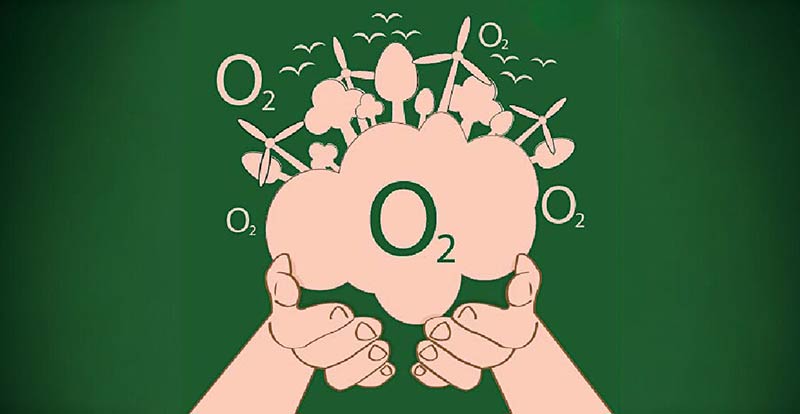
by Dr. Ranil Senanayake
The Oxygen that is present in the air that we breathe is the birth right of every organism that lives on this planet. It is free for everyone. However, the action of some to take out more than their share, without replacement, has created a condition, where the Global Commons of air is being rapidly degraded,
The most critical component of air is Oxygen. It surrounds us, filling our lungs with every breath we take. It is the invisible gift of nature that we take for granted. But this essential resource—the very foundation of life— is being constricted, because the volume of trees, plants, and photosynthetic organisms that produce oxygen is being lost across the planet. Further, there is no initiative for this generation capacity to be increased as a matter of urgency. exploited at present? Why couldn’t increasing the generation capacity of Oxygen have economic value? Could those who benefit most from using the resources of the Global Commons be required to contribute to its maintenance? This is the idea behind the Oxygen Economy, a bold and transformative concept that seeks to address environmental and social challenges in a way that is fair, sustainable, and forward-thinking beyond GDP value which measures the success of our societies today.
What Is the Oxygen Economy?
The Oxygen Economy is a financial framework, that recognises the value of the global stocks of Oxygen within the commons and records the deposition and consumption through economic activity.
The Oxygen Economy is a principled framework that recognises the stocks, transactions and deposits of Oxygen into the Global commons and assigns value to stocks from privately contracted production units, it stems from a growing recognition that Oxygen is a declining resource with an easy replenishment response.
Oxygen, considered a “free” resource. It is not. Much like oil and coal it is a ‘fossil’ resource that has been a part of the atmosphere for millions of years. It has been slowly declining, but is ‘topped up’ by a service provided by the earth’s ecosystems —particularly trees, plants, and other photosynthetic organisms. These organisms create molecular Oxygen through the process of photosynthesis, supporting life on earth and maintaining the balance of our atmosphere.
At its core, the Oxygen Economy aims to ensure that those who produce contracted and monitored oxygen, be it towns, farmlands, rural or forested lands, are fairly compensated for their efforts. It also holds industries and private-sector entities that benefit from oxygen consumption accountable in maintaining the sustainability of this resource.
What is the urgency to address oxygen as a depleting resource?
Other than the obvious fact of falling global stocks, the need of an Oxygen Economy arises from the urgency of addressing two critical challenges facing humanity: environmental degradation and economic inequality. Placing value on Oxygen production could effectively provide an effective response to both. For decades, efforts to combat climate change have focused primarily on carbon
sequestration. While important, the focus on Carbon sequestration often overlooks other vital ecosystem services, including oxygen production that can contribute towards a growing wealth paradigm. Oxygen, like water and food, is essential for life. However, unlike other resources, it has largely been treated as infinite and freely available, which it is not. In reality, the supply of Oxygen to the atmosphere is decreasing due to deforestation, while the consumption of Oxygen by space exploration, industrial production, war and transport are increasing. Today Oxygen levels have dropped by approximately 2%, raising concerns about the long- term sustainability of this critical resource.
How the Oxygen Economy works
The Oxygen Economy operates on the principles of private property being valued using financial tools such as valuation guarantees, stakeholder contracts and Insurances to monetise contractually produced oxygen as a financial product. This involves three key components:
1. Valuation guarantee:
Assigning an economic value to the oxygen produced by contracted and registered units in identified geographical areas of production is based on the researched, monitored and validated measurements of oxygen generation by trees / plants or photosynthetic organisms such as Cyanobacteria.
2. Deposition guarantee:
Issuance of certificates of completion and deposit of Oxygen into the global Commons Stakeholder Contracts and Compensation: Establishing formal agreements between oxygen consumers (e. g., corporations / Space exploration companies) and contracted oxygen producers (e.g., farmers, Local communities)
3. Policy and regulation: Introducing replicable legal frameworks at a regional scale to enforce accountability and prevent the uncontrolled exploitation of global oxygen resources.
Lessons from Sri Lanka
One country that is already exploring the potential of the Oxygen Economy is in the bioregional area of Sri Lanka. Known for its rich biodiversity and commitment to environmental stewardship, Sri Lanka has implemented initiatives that align with the principles of the Oxygen Economy. In one notable project, women from farming communities established and nurtured trees using contracts that measured and validated payments for photosynthetic biomass on an annually recurring basis for a period of four years. The stakeholders earning substantive income from this project were sensitised to the emerging Oxygen Economy while contributing their obligations to global environmental resilience. Over three years, these participants generated thousands of litres of oxygen, demonstrating that the concept is not only viable but also impactful.
Scaling the Oxygen Economy globally:
While Sri Lanka’s efforts are a promising start, the true potential of the Oxygen Economy
lies in its ability to scale globally. Imagine a world where farmers are compensated for the establishment of trees, where rural and even urban greenery projects could receive funding to expand their impact for this paradigm of business. Such a system would not only help combat climate change but also address economic inequalities of the current GDP paradigm, by together contracting the Oxygen economic asset tool to those who sustain the planet’s life-support systems.
Addressing potential challenges
Like any transformative idea, the Oxygen Economy faces potential challenges. Critics may argue that assigning a monetary value to Oxygen risks commodifying a natural resource that should remain freely accessible. Others may question the feasibility of measuring, validating and regulating oxygen production on a global scale. These concerns can be addressed by emphasising the ethical principles behind the Oxygen Economy. The goal is not to charge people for breathing but to ensure that those who contribute to its sustainability profit from financial contracts for Oxygen production. Additionally, such transparent systems for measuring and validating oxygen production will be crucial for building trust and ensuring fairness towards the vision of accounting for intergenerational wealth beyond the GDP framework that exists.
A vision for the future
The Oxygen Economy represents a paradigm shift in how we think about our relationship with the planet. It challenges us to move beyond the notion of nature as an infinite resource and to recognise the boundaries of our Global Commons. The true value of planet Earth is as an ecosystem that sustains life for all biota. By aligning economic practices with environmental stewardship, the Oxygen Economy offers a path towards a more equitable and sustainable future. It supports the foundations of intergenerational wealth that will be reflected in our contributions to the cycling atmospheric gasses of our Global Commons.
Imagine a world where the air we breathe is not taken for granted but is cherished and protected. Where farmers, communities, and ecosystems are rewarded for their contributions to the planet’s well-being. Where industries operate with a framework of accountability to prioritise the health of our shared environment. This is the vision of the Oxygen Economy—a vision that is within our reach if we act together, with urgency and determination, to lay well informed, solid foundations.
Features
Two sides to a coin; each mourn threat; no threat, no budget blues

 The coin Cassandra starts her Friday Cry with the recent film Rani. Parroting what her friends said on seeing the film, Cass in her Cry just prior to this wrote: “It has been reviewed as outstanding; raved over by many; and already grossed the highest amount in SL cinema history – Rs 100 million from date of release January 30 to February 14. This last: testimony to its popular appeal and acceptance as an outstanding cinema achievement.
The coin Cassandra starts her Friday Cry with the recent film Rani. Parroting what her friends said on seeing the film, Cass in her Cry just prior to this wrote: “It has been reviewed as outstanding; raved over by many; and already grossed the highest amount in SL cinema history – Rs 100 million from date of release January 30 to February 14. This last: testimony to its popular appeal and acceptance as an outstanding cinema achievement.
” Cass admitted she had not seen the film. She now realises her reluctance to jostle in the crowd in one of many cinemas retelling the murder of Richard de Zoysa and traumatic mourning of his mother, Manorani, was because there grew in her a distaste after watching short previews on YouTube of parts of the film. Most centered on is Swarna Mallawarachchi, starring as Manorani, downing alcohol and smoking cigarette after cigarette. Director Asoka Handagama was sensationlising the more dramatic incidents of the tragedy. That was to please the crowd.
We Sri Lankans, or many, have absolutely no tight upper lip. Most funerals of yesteryear and many rural ones still have writhing moaning and groaning and appeals to the dead to smile one more time, say a word, rise up. These loud gasped cries in between sobbing sent Cass wickedly into silent giggles. She thought: what if the dead obliged with even one request. Worst, if he rose up and sat in his coffin. The first to run away would be the callers! People love wallowing in sniffles of sorrow. Audiences much prefer fictionalised retelling of events to documentaries about them. Handagama does style his film as fictionalised history but he definitely is guilty of sensationalism. Cass’ gut feelings have been given words in a criticism on Face Book which was shared with Cass by a nephew.
The sent around message is titled: Misconceived, Misinterpreted, Miscast and a Big Mistake. That tells it all. However there follows an incisive critique of the film Rani by one of Richard’s friends who knew Manorani well and how she was after her son’s death. He signs himself, but Cass will not quote the name here since there is much truth, lies and even hidden agendas in what is posted on social media.
He writes: “Badly acted, badly directed and badly researched … A clear example of character assassination via a deliberate misuse of artistic license! … I want to state my opinion about two people that many of us loved, respected and knew intimately.” He then goes on to point out mistakes and exaggerations: Manorani was never even bordering on alcoholism and hardly ever smoked. And when she did, socially or to dim her sorrow, she did it elegantly. A Man Friday commented: they should have taught Swarna how to hold a cigarette and smoke it as it should be smoked. Hence my contention, every coin, even a box office success, has two sides to it, two diverse criticisms and in-betweens. Decision: Cass will not queue for a cinema ticket.
Each morn
Phoned a US living friend who was recovering from a harsh winter’s gift to her – severe flu. She said the flu was leaving her but depression and distraught-ness about hers and the US’s future were threatening to drown her in emotional turmoil much worse than the worst cough ‘n cold.
I knew the reason – Trump’s trumpets of new opinions, threats, enactments et al. She dreaded getting up each morning wondering what new calamity was to descend on the American people and by influence, spreading to the world. Her son has forbidden TV news watching and reading the newspapers which she says are so opposed to media treatment of the Prez.
I could very well sympathise with her. We in Sri Lanka suffered bouts of such threatened discomfort, nay calamitous warnings and sheer dread. My remembering mind went to Shakespeare in his tragic play Macbeth. Macduff’s description of Scotland under the reign of Macbeth to Malcolm, son and heir of murdered Duncan now sheltered in England, goes thus: “Each new morn/ New widows howl, new orphans cry/ new sorrows strike heaven on the face that it resounds.”
Cass does not know about you but dread lurked in her heart and mind when the JVP 1989 insurrection took place – for her teenage son. The LTTE and suicide bombs caused utter destruction of life, limb and infrastructure. Families who had travelled together now travelled to schools and workplaces separately since no bus or train was safe. Nor were the privately owned cars. Then came two tyrant Presidents with sudden deaths of prominent persons and media personnel like Richard and Lasantha and many others.
Blatant robbing of our money had us gasping helplessly. Riff raff rose in power and lorded, one such tying a man to a stake for not attending a meeting. Then rode to power on popular vote another brother in the newly created powerful dynasty. Word of mouth minus stroke of pen had orders given out to be promptly executed. White vans which plied the streets were reduced but worse happened.
One order and the rice fields had no grain, fruits dried on trees, forex earning luscious two leaves and a bud withered and could not be plucked. Bankruptcy resulted. But we had a ‘shipless’ harbour which had to be mortgaged for a song to the Chinese; a plane-less airport sounding death to elephants and peafowl; and a gaudy tower to gaze on or commit suicide from. A gathering of people on Galle Face Green righted things.
Then came into power a party that had two men and a woman in Parliament which yielded a true Sri Lankan with country first and last in mind, as President. Followed a sharp victory for the coalition of parties led by the hopefully reformed JVP so that three seats became almost two thirds of all seats in Parliament and a woman as Prime Minister. She had no connection to previous Heads unlike a former woman PM and Prez. The first woman PM rode to power weeping for her murdered husband; the younger very promising Prez because she was daughter of two Heads of Sri Lanka. But there was, even under their reign, mutterings and difficulties.
Truth be told, we sleep better at night and wake up with no dread in our innards. We rise to shine (if possible, in the heat of Feb) knowing people are working and corruption is not wrought by those in power. Thank goodness and our sensible voters for this peace we savour.
2025 Budget
Cass’ title has the phrase ‘no budget blues’. Looks like it is generally correct. Of course, the Opposition is criticising Finance Minister AKD’s presented budget. Cass is no economist, not by a long chalk, but she was glad to see that expenditure on health and education were substantial. We had a time when the armed forces were allocated more than education and health combined. Much has been looked into: including pregnant women and the Jaffna library among a host of mentioned amenities. We have no need to pessimistically await a Gazette Extraordinary stating negative segments of the future year’s financial plan. Thanks be!
Gaza and Ukraine are worse in position and the world is awry. But Sri Lanka is in a phase where Kuveni’s curse is stilled and people are considering themselves Sri Lankans, uniting to re-make Sri Lanka Clean as it was before selfish corrupt politicians took over.
Features
As Africa toes Chinese line …
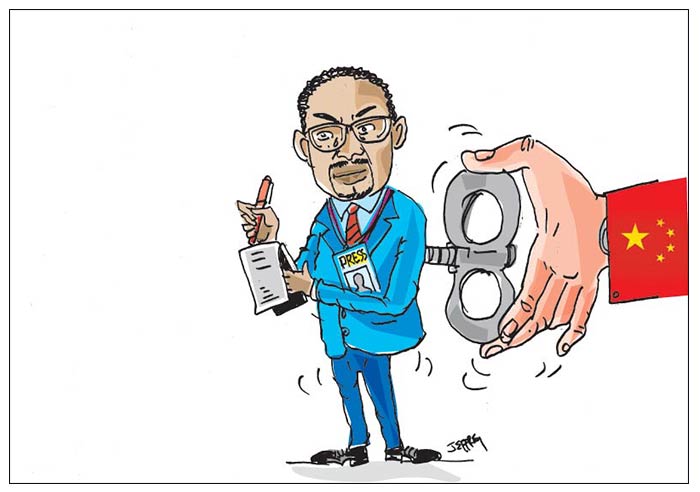
Mitchell Gallagher
Every year, China’s minister of foreign affairs embarks on what has now become a customary odyssey across Africa. The tradition began in the late 1980s and sees Beijing’s top diplomat visit several African nations to reaffirm ties. The most recent visit, by Foreign Minister Wang Yi, took place in mid-January 2025 and included stops in Namibia, the Republic of the Congo, Chad and Nigeria.
For over two decades, China’s burgeoning influence in Africa was symbolised by grand displays of infrastructural might. From Nairobi’s gleaming towers to expansive ports dotting the continent’s shorelines, China’s investments on the continent have surged, reaching over $700 billion by 2023 under the Belt and Road Initiative, China’s massive global infrastructure development strategy.
But in recent years, Beijing has sought to expand beyond roads and skyscrapers and has made a play for the hearts and minds of African people. With a deft mix of persuasion, power and money, Beijing has turned to African media as a potential conduit for its geopolitical ambitions. Partnering with local outlets and journalist-training initiatives, China has expanded China’s media footprint in Africa. Its purpose? To change perceptions and anchor the idea of Beijing as a provider of resources and assistance and a model for development and governance. The ploy appears to be paying dividends, with evidence of sections of the media giving favourable coverage to China.
But as someone researching the reach of China’s influence overseas, I am beginning to see a nascent backlash against pro-Beijing reporting in countries across the continent. China’s approach to Africa rests mainly on its use of “soft power,” manifested through things like the media and cultural programmes. Beijing presents this as “win-win cooperation”—a quintessential Chinese diplomatic phrase mixing collaboration with cultural diplomacy. Key to China’s media approach in Africa are two institutions: The China Global Television Network (CGTN) Africa and Xinhua News Agency.
CGTN Africa, which was set up in 2012, offers a Chinese perspective on African news. The network produces content in multiple languages, including English, French and Swahili, and its coverage routinely portrays Beijing as a constructive partner, reporting on infrastructure projects, trade agreements and cultural initiatives. Moreover, Xinhua News Agency, China’s state news agency, now boasts 37 bureaus on the continent. By contrast, Western media presence in Africa remains comparatively limited.
The BBC, long embedded due to the United Kingdom’s colonial legacy, still maintains a large footprint among foreign outlets, but its influence is largely historical rather than expanding. And as Western media influence in Africa has plateaued, China’s state-backed media has grown exponentially. This expansion is especially evident in the digital domain. On Facebook, for example, CGTN Africa commands a staggering 4.5 million followers, vastly outpacing CNN Africa, which has 1.2 million—a stark indicator of China’s growing soft power reach. China’s zero-tariff trade policy with 33 African countries showcases how it uses economic policies to mould perceptions.
And state-backed media outlets like CGTN Africa and Xinhua are central to highlighting such projects and pushing an image of China as a benevolent partner. Stories of an “all-weather” or steadfast China-Africa partnership are broadcast widely and the coverage frequently depicts the grand nature of Chinese infrastructure projects. Amid this glowing coverage, the labour disputes, environmental devastation or debt traps associated with some Chinese-built infrastructure are less likely to make headlines. Questions of media veracity notwithstanding, China’s strategy is bearing fruit.
A Gallup poll from April 2024 showed China’s approval ratings climbing in Africa as US ratings dipped. Afrobarometer, a pan-African research organisation, further reports that public opinion of China in many African countries is positively glowing, an apparent validation of China’s discourse engineering. Further, studies have shown that pro-Beijing media influences perceptions. A 2023 survey of Zimbabweans found that those who were exposed to Chinese media were more likely to have a positive view of Beijing’s economic activities in the country. The effectiveness of China’s media strategy becomes especially apparent in the integration of local media.
Through content-sharing agreements, African outlets have disseminated Beijing’s editorial line and stories from Chinese state media, often without the due diligence of journalistic scepticism. Meanwhile, StarTimes, a Chinese media company, delivers a steady stream of curated depictions of translated Chinese movies, TV shows and documentaries across 30 countries in Africa. But China is not merely pushing its viewpoint through African channels. It’s also taking a lead role in training African journalists, thousands of whom have been lured by all-expenses-paid trips to China under the guise of “professional development.” On such junkets, they receive training that critics say obscures the distinction between skill-building and propaganda, presenting them with perspectives conforming to Beijing’s line.
Ethiopia exemplifies how China’s infrastructure investments and media influence have fostered a largely favourable perception of Beijing. State media outlets, often staffed by journalists trained in Chinese-run programmes, consistently frame China’s role as one of selfless partnership. Coverage of projects like the Addis AbabaDjibouti railway line highlights the benefits, while omitting reports on the substandard labour conditions tied to such projects—an approach reflective of Ethiopia’s media landscape, where state-run outlets prioritise economic development narratives and rely heavily on Xinhua as a primary news source. In Angola, Chinese oil companies extract considerable resources and channel billions into infrastructure projects.
The local media, again regularly staffed by journalists who have accepted invitations to visit China, often portray Sino-Angolan relations in glowing terms. Allegations of corruption, the displacement of local communities and environmental degradation are relegated to side notes in the name of common development. Despite all of the Chinese influence, media perspectives in Africa are far from uniformly pro-Beijing. In Kenya, voices of dissent are beginning to rise and media professionals immune to Beijing’s allure are probing the true costs of Chinese financial undertakings. In South Africa, media watchdogs are sounding alarms, pointing to a gradual attrition of press freedoms that come packaged with promises of growth and prosperity.
In Ghana, anxiety about Chinese media influence permeates more than the journalism sector, as officials have raised concerns about the implications of Chinese media cooperation agreements. Wariness in Ghana became especially apparent when local journalists started reporting that Chinese-produced content was being prioritised over domestic stories in state media.
Beneath the surface of China’s well publicised projects and media offerings, and the African countries or organisations that embrace Beijing’s line, a significant countervailing force exists that challenges uncritical representations and pursues rigorous journalism. Yet as CGTN Africa and Xinhua become entrenched in African media ecosystems, a pertinent question comes to the forefront: Will Africa’s journalists and press be able to uphold their impartiality and retain intellectual independence? As China continues to make strategic inroads in Africa, it’s a fair question.
(The writer is a PhD candidate of political science at Wayne State University, US. This article was published on www.theconversation.com)
-

 Sports5 days ago
Sports5 days agoRemarkable turnaround for Sri Lanka’s ODI team
-
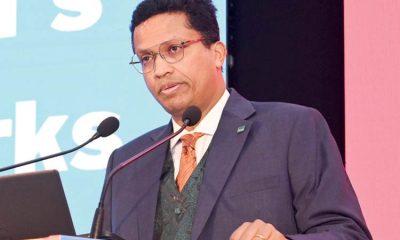
 Business5 days ago
Business5 days agoUN Global Compact Network Sri Lanka: Empowering Businesses to Lead Sustainability in 2025 & Beyond
-

 Features5 days ago
Features5 days agoScammed and Stranded: The Dark Side of Sri Lanka’s Migration Industry
-
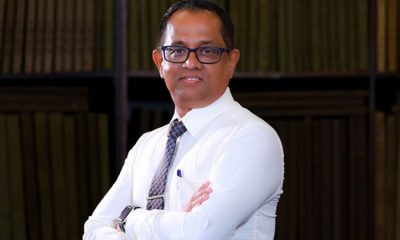
 News6 days ago
News6 days agoSpeaker agrees to probe allegations of ‘unethical funding’ by USAID
-
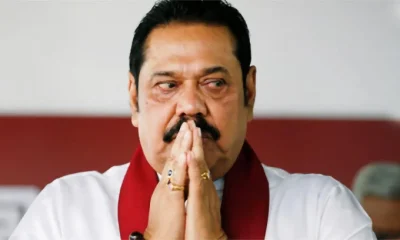
 Features4 days ago
Features4 days agoDon’t betray baiyas who voted you into power for lack of better alternative: a helpful warning to NPP – II
-
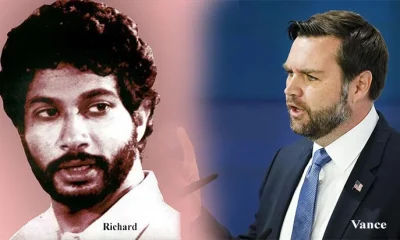
 Features4 days ago
Features4 days agoTwo films and comments
-

 Editorial6 days ago
Editorial6 days agoCoal giant awakes, but uncertainty prevails
-

 News2 days ago
News2 days agoCommercial High Court orders AASSL to pay Rs 176 mn for unilateral termination of contract











